This article is part of our Gay Movies Guide where we review queer cinema from around the world. For more BL dramas, check our full BL Series Index.
Korean BL movies offer a unique perspective in LGBTQ+ cinema, often portraying intimate personal journeys that reflect broader social issues. Unlike Western gay films that frequently showcase collective experiences within historical contexts, Korean gay dramas excel at using individual stories to illuminate family dynamics and societal pressures.
If you’re interested in how different cultures express queer identity on screen, you might also enjoy our region-based guides to Chinese gay movies, British gay films, and Japanese gay cinema—each with its own narrative rhythm and emotional tone.
Best Korean Gay Movie List Since 2020
Genre: Romance, Drama
Runtime: 101 minutes
Rating: ★★★★ (8.3/10)
Where to Watch: Watcha, Wavve
Synopsis: Growing up together like brothers, Ho-tae and Dong-hee were Years ago, Ho-tae relocated to Seoul; now, he comes back to Gangneung following the funeral of his father. Dong-hee lives alone at Ho-tae’s family’s vacant house after being booted from his house after coming out. Years apart notwithstanding, the two start sharing a roof. Dong-hee attempts to contain his aroused emotions when he encounters Ho-tae once more—who is both like a brother and his first love—but it is difficult. Ho-tae starts randomly dating females to get away from his mixed emotions for Dong-hee as well. Seeing this hurts Dong-hee, but following an unplanned event their unstable relationship starts to gradually transform.
Review: Female directors oversee BL (Boys’ Love) dramas to really highlight the adage that “Beautiful men in love stories are created by women.”
Genre: Drama, Romance, Comedy
Runtime: 118 minutes
Rating: ★★★★★ (7.9/10)
Where to Watch: Netflix, JTBC
Synopsis: The movie follows free-spirited woman Eun-hee (Kim Go-eun), who lives life on her own terms, and Heung-soo (Ryu Sang-hyun), who excels in concealing his natural secrets. Sharing both living quarters and life’s joys, roommates negotiate life and love with careless abandon.
Review: Adapted from Park Sang-young’s book “Eun-hee, Soju, Me, and the Blueberries and Cigarette in the Refrigerator,” which was nominated for the Booker Prize and the Dublin Literary Award, One could rank it as the best Korean film of 2024. The Korean cinema business is so advanced that it can now turn light-hearted, fun commercial popcorn movies out of major societal concerns like feminism and LGBTQ+ themes.
Genre: Drama, Romance
Runtime: 154 minutes
Rating: ★★★★★ (8.2/10)
Where to Watch: Watcha, YouTube Premium
Synopsis: At a funeral, thirty-one-year-old Joo-young unexpectedly finds his first love Do-hoe, whom he has been yearning for 12 years.
“It feels like everything was cursed…” The two connected with each other’s suffering twelve years ago and fell in great love; how then did they grow to be strangers? Can Do-hoe, without his ambition, and Joo-young, still Taekwondo practitioner, remove the curse of the past today?
Review: I’ve seen better BL drama in 2024 than this. Public Relationships Yellow never fails in her works. Every shot has meaning; the actors perform brilliantly; the filming style is delicate; the story is tight. Every frame in this work communicates something significant and has foreshadowing, hence it should be seen closely and deserves several views.
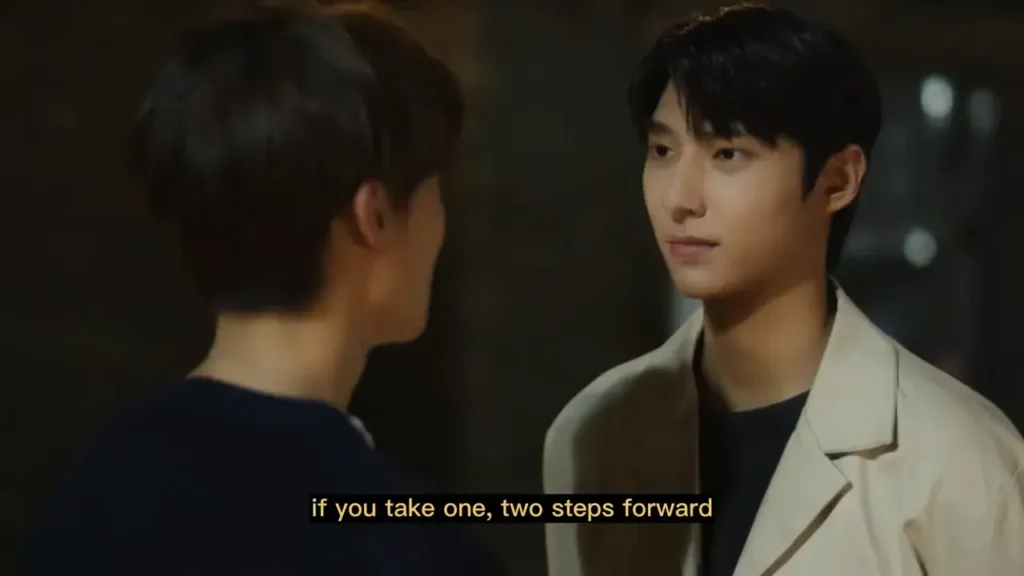
Genre: Drama, Romance
Runtime: 118 minutes
Rating: ★★★★ (7.5/10)
Where to Watch: Watcha, Viki
Synopsis: Ji-hyun recently started at a Seoul university. Coming from a small town, he is used to live in a calm countryside environment. Turning now to the crowded Korean metropolis, he becomes lost and perplexed. As this is happening, the older Jae-won comes back to Seoul—and the same university—after finishing his required military duty. The two start to show mutual curiosity about one another. Their relationship starts to heat when they join the same surfing club.
Review: “The Eighth Sense” is quite special among other BL dramas. Director-screenwriter Baek In-woo’s ambition most certainly transcended producing a “traditional” BL drama when we consider the mottled, dim lighting, stream-of- consciousness editing style, and deft portrayal of individuals’s anxiety, distress, helplessness, and pain during various life transitions. Rather, based on this increasingly sophisticated genre, he has created a new mode that is in some ways “anti-BL,” or we might just call it a “new” LGBT drama.
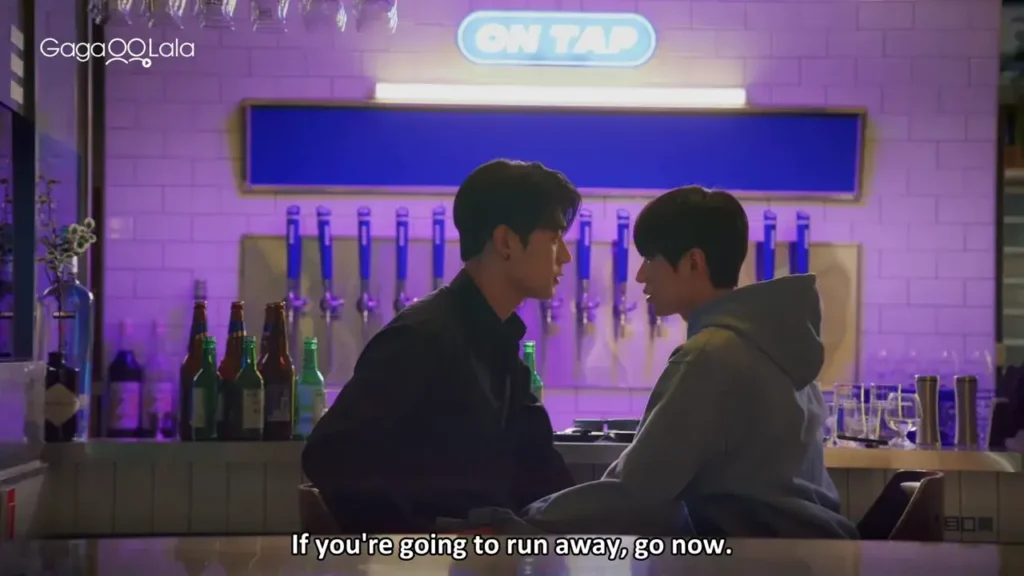
Genre: Romance, Comedy
Runtime: 178 minutes
Rating: ★★★★ (8.1/10)
Where to Watch: Viki, WeTV
Synopsis: Fourth-year student Jang Jae-young (Park Seo-ham), a visual design department campus star with model-like dimensions and appearance, Third year mechanical engineering student Chu Sang-woo (Park Jae-chan) is academically outstanding but rather dorky. He is a marginalized student with great logical ability. Though they have somewhat distinct personalities, they eventually develop a mobile game together. For Sang-woo, Jae-young is like a semantic mistake in a computer program—a bug. Between them, a charming campus romance develops.
Review: Combining all eight episodes plus previously unpublished footage, this re-edited film version of the drama series is.
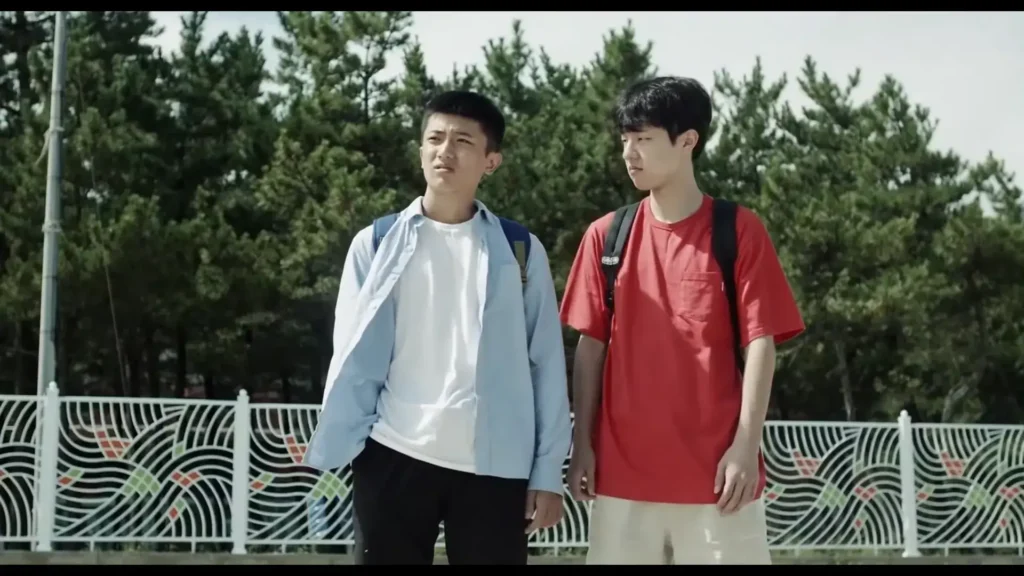
Genre: Drama
Runtime: 30 minutes
Rating: ★★★★ (8.1/10)
Where to Watch: YouTube, Vimeo
Synopsis: Min-ho and Sanbeom, two high school students, are gay couple. They head to the beach to mark their one hundred-day anniversary. Min-ho freely shows his love for Sanbeom even in public venues, not especially worried about others’ perceptions; Sanbeom always feels uneasy with this. Sanbeom unveils a secret to Min-ho that evening.
Review: A very weighty topic, anti-gay bullying touches on many childhood traumas in the homosexual community and can be highly upsetting in cinematic form. Though only 30 minutes long, the recently released Korean film “Journey to the Shore” tackles school bullying and has gained popularity in LGBT communities. A masterwork, the already mentioned “Night Flight” is also a Korean film depicting anti-gay bullying. Koreans are quite good in capturing this sort of topic.
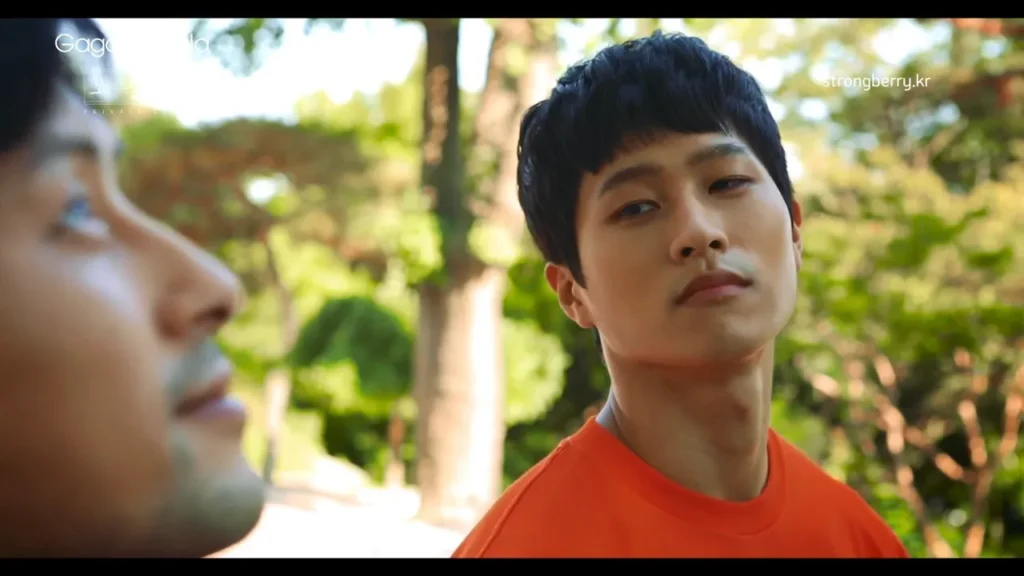
Genre: Drama, Romance
Runtime: 24 minutes
Rating: ★★★★ (7.2/10)
Where to Watch: Vimeo, GagaLala
Synopsis: Park Jae-hyun, a tall and attractive athlete, is held after school by his teacher for failing his poetry project. With their footsteps exploring Seoul’s varied terrain, the two start private literature creation courses outside of the classroom. Jae-hyun turns in a love poetry as his project for final exams, which causes the teacher to fantasize only to be blasted with reality’s cold water. He chooses to cut his emotions after this terrible lecture, but he ends up sealed with a kiss from his pupil.
Review: Without a single wasted word, this twenty-something-minute short film shows the spectator the most beautiful phase before a marriage starts.
Best Korean Gay Movie List From 2000 to 2020
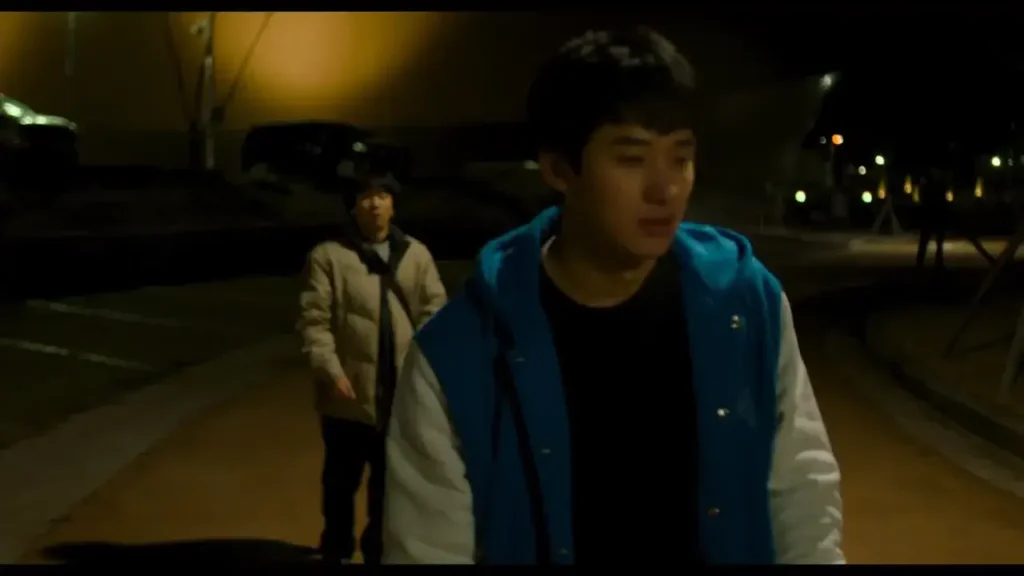
Genre: Drama, Romance
Runtime: 110 minutes
Rating: ★★★★ (7.1/10)
Where to Watch: MUBI, Amazon Prime
Synopsis: Set on Jeju Island, “The Poet and The Boy” chronicles the passionate meeting between a poet, his wife, and a young guy upsetting all three’s everyday routines. Native Jeju poet forty years old yearning for a kid with his wife. Their lives alter when they encounter a simple but pure young man in a narrative examining the worth of love and priceless relationships.
Review: One character is a young man in terrible down-on-his-luck; the other is an elderly, destitute poet. Though absolutely different, they are magnetically drawn to one another.
Their understated, gradually flowering appeal is amazing. In my favorite scene, they alternately write poetry on a bus while their imagined images flow across the same emotional terrain—a lovely portrayal of spiritual connectedness.
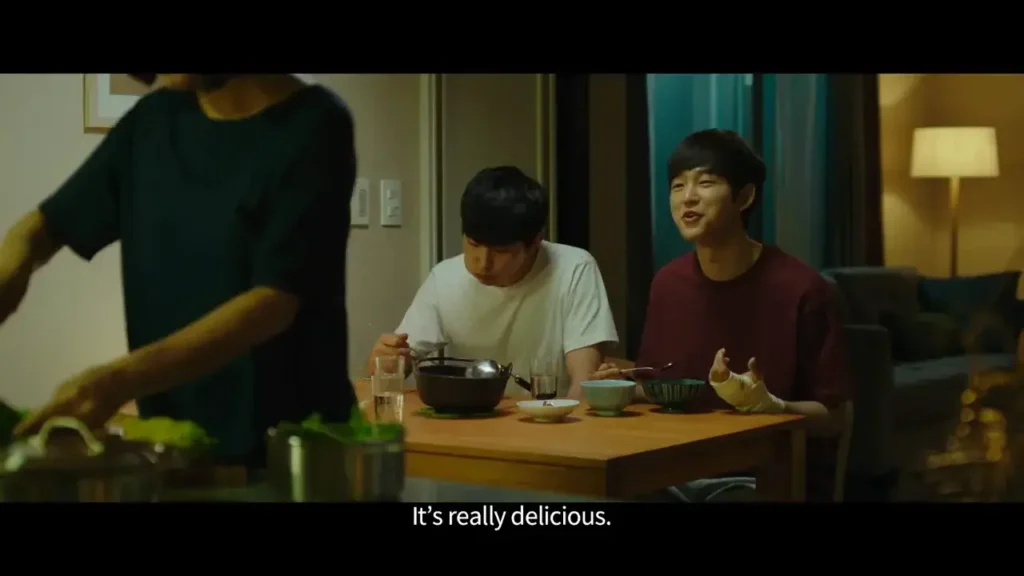
Genre: Drama, Family
Runtime: 115 minutes
Rating: ★★★★ (7.7/10)
Where to Watch: MUBI, Tubi
Synopsis: “In Between Seasons” mostly chronicles what happened between a mother, her son, and his buddy following her discovery of their secret.
Review: At the 21st Busan International Film Festival, the movie took first place in KNN Audience Awards. Without dramatic ups and down or hysterics, this very normal family emotional picture set against an Eastern societal context emphasizes silent fortitude, swallowing shattered teeth, and “keeping family shame private.” Audiences from the East Asian cultural realm will particularly relate strongly with this.

Genre: Drama
Runtime: 135 minutes
Rating: ★★★★★ (8.3/10)
Where to Watch: Asian Crush, Tubi
Synopsis: High school honors students Yong-ju and Ki-woong encounter both pressure from their classmate Ji-hoon on the college entrance exam and bullying. Originally childhood closest friends, the three broke apart over a prior event. Ji-hoon grabs Yong-ju’s bike following an off-campus brawl, therefore putting their lives back into touch. Only silently able to guard Yong-ju’s emotions, Ji-hoon is the object of long-hidden affection for which Yong-ju must find the confidence. Feeling deceived, Ki-woong purposely tells stories about their male-male passion across the university, therefore endangering both Yong-ju and Ji-hoon in hitherto unheard-of risk.
Review: Selected for the Panorama section of the 64th Berlin International Film Festival, “Night Flight” is the most recent creation of praised Korean gay director Lee Song Hee-il following “No Regret.” Starting with an abandoned homosexual club known as “Night Flight, the director progressively reveals the love-hate entanglement between two high school students, so openly revealing the little-known problem of school violence in Korean society.
The director is expressing the harsh facts of society, not only a love story. Using high school as a microcosm, “Night Flight” reflects through personal tales the more general problems resulting from South Korea’s elite education system. One could classify Lee Song Hee-il’s work as most ambitious to date.

Genre: Drama, Road Movie
Runtime: 45 minutes
Rating: ★★★★ (7.2/10)
Where to Watch: Asian Crush, Korean Film Archive
Synopsis: Serving in the military, officer Jun-young (Jeon Sin-hwan) and soldier Ki-tae (Kim Jae-heung) were lovers. Jun-young started dating a woman after he was let go early and tried to fit in with regular society. His letters to Ki-tae started off as impassioned but then grew ordinary. Using his last leave to hunt for Jun-young, Ki-tae hopes to live up to their former promise—that of a southern journey together. Jun-young covertly adds sleeping medications to his drink to get him on the road. The car thus takes a deserting soldier and his sleeping lover, silently going south alongside lotus leaves brushing the sky, summer cicadas, and changing vegetation.
Review: With “No Regret,” Lee Song Hee-il—who rose to become a major player in Korean independent film—said “Going South” “mostly addresses the boundary between homosexuality and heterosexuality.” “He feels many people are opportunistic and situational in their sexual orientation, but society demands that people’s desires conform obediently to expectations, causing many people pain of identification.” Along with “Suddenly, Last Summer” and “White Night,” “Going South” forms Lee Song Hee-il’s “Two Days and One Night” trilogy on the agony of homosexual love.
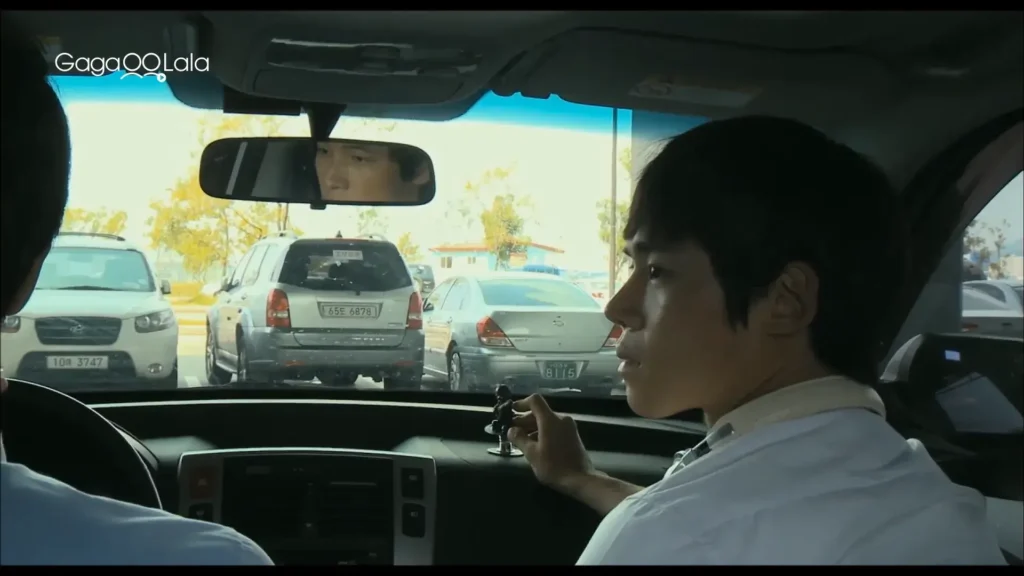
Genre: Drama
Runtime: 40 minutes
Rating: ★★★★ (7.2/10)
Where to Watch: Korean Film Archive, Vimeo
Synopsis: After Lee Sang-woo, an 18-year-old high school student, runs across his homeroom teacher at a gay bar in Seoul, he chooses to use covertly obtained pictures as leverage to get the instructor to spend a summer day with him. ” I am your teacher!” “But you have been looking at me subtly during class.” The kid goes constantly toward the teacher’s powerful push away. Together, they join a Han River cruise; their teacher-student relationship gets trapped in an uncomfortable state of advances and retreats, like the steam rising from the river rippling with the humid atmosphere of a sudden summer.
Review: Along with “White Night” and “Going South,” this picture is the latest creation of eminent Korean homosexual director Lee Song Hee-il, who brought us “No Regret,” forms his “Two Days and One Night” trilogy portraying tales of “queer love’s pain.” Under the combined limitations of homosexuality and teacher-student relationships, the director investigates interpersonal feelings using gorgeous images and emotional control that shows great expertise.

Genre: Drama, Romance
Runtime: 30 minutes
Rating: ★★★★ (7.2/10)
Where to Watch: YouTube, Vimeo
Synopsis: Though guys, Seok-i ( Lee Je-hoon) and Min-soo (Yeon Woo-jin) are in love. They have a close relationship having spent many years together. Min-soo is performing his military obligation right now, hence Seok-i’s only means of expression is letters. At last Seok-i has a rare opportunity to see Min-soo, and he is quite happy about this long-awaited day.
Surprising Seok-i, though, Min-soo shows up with his mother. Seok-i can only show his love by looks and gestures under her careful observation; he is not daring to move. Still, paper cannot last forever and Min-soo’s mother starts to doubt the actual nature of Seok-i’s relationship with her son. Given an elder’s mistrust, how will Min-soo react?
Review: Just Friends! is a really great movie. It presents a nice and slightly funny tale in thirty minutes. Simple but elegantly expressed, with delicate attention to minute elements. What stays is the comfort of daily living without the big ups and downs or heartbreaking events of many movies. A wonderful sensation fills your heart when the two male leads go hand-in-hand across the streets and kiss nonconsciously in the square. This is bliss!

Genre: Historical Drama, Romance
Runtime: 133 minutes
Rating: ★★★★ (7.1/10)
Where to Watch: Netflix, Amazon Prime
Synopsis: Strongly devoted to the Korean King (Joo Jin-mo), the royal guard “Geonryongwae” swears to defend him at whatever means in the late Goryeo dynasty. The two have kept a tight, personal contact for years; their commander, Hong-rim (Jo In-sung) is the preferred official of the King. After several years, the Princess (Song Ji-hyo), who arrived from Mongolia via an arranged marriage, is abandoned and stays childless. The Yuan Dynasty replaces the present Korean King under cover of lack of an heir. Desperate, the King plans for his adored official to sleep with the Queen in hopes she would pregnant and remove Yuan’s justification for removing him. Discovering the pleasures of heterosexual companionship, Hong-rim and the Queen covertly grow in feelings for one another behind the King’s back. Though the King notes Hong-rim’s transformation, he still works to mend their connection. But he has Hong-rim castrated in a fit of wrath when he personally sees the Queen and Hong-rim’s affair, therefore severing their relationship beyond the point of recovery.
Review: A tragedy of human nature, “A Frozen Flower” tells the tale of a man who must pay the ultimate cost for his discovery of his own self via love.
In “Pornography and Obscenity,” D.H. Lawrence observed: “What is pornography to one man is the laughter of genius to another.” This quotation sums up the reception of “A Frozen Flower” exactly.

Genre: Drama, Romance
Runtime: 14 minutes
Rating: ★★★★ (7.2/10)
Where to Watch: Korean Film Archive, Vimeo
Synopsis: The narrative, which takes place at a far-off, scarcely inhabited post office, centers on two female workers whose sole source of pleasure is a young man who routinely visits to mail letters. When the young man delivers a postcard with a love message one day, both women think it is meant for them. The more impetuous worker chooses to visit the young man’s house, only to find the shocking realit.
Review: Two guys—the young man distributing postcards and the mail carrier Chung-woo—are the actual heroes. Serving as observers to the men’s story are the two ladies, both post office counter agents and Chung-woo colleagues. Though not in an unpleasant manner, the women totally reflect gossipy and enamored traits. Both of them are really beautiful. Their point of view gives the narrative more suspense and turns, therefore increasing its appeal.
The narrative between the two men has a soft blue tone akin to calm waves. Though not the major emphasis, the red high heels provide a striking accent color in this delicate watercolor painting, which accentuates the blue feel even more fresh and moving.
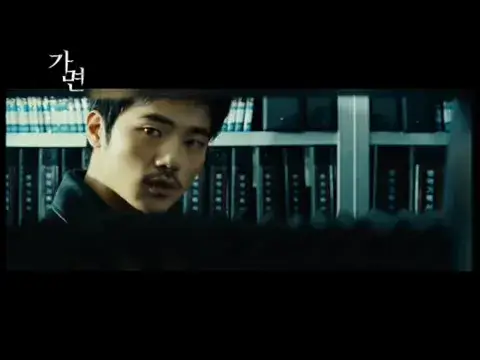
Genre: Thriller, Mystery, Drama
Runtime: 99 minutes
Rating: ★★★ (7.5/10)
Where to Watch: Korean Film Archive, Amazon Prime
Synopsis: Police find the man killed in his flat was a wealthy sports center patron. There is just hair from a type AB man at the site as the clue. A bargirl who called the victim before his death is the first suspect. Officer Cho Kyung-yoon (Kim Kang-woo) visits to gather samples. But Kyung-yoon discovers from peers that things have changed. They start to assume the victim had a gay relationship with a swimming facility coach. Not long later, this suspect is also killed quite violently. The police begin to believe the case relates to the military service background of the victims. Investigating alongside Kyung-yoon, Officer Park Eun-joo (Kim Min-sun) is a classmate from police academy. Though she has a tomboy attitude, she really loves Kyung-yoon and yearns for protection. Kyung-yoon must make more difficult emotional decisions, though, since she has an on-and-off lover in addition to a consistent partner. Kyung-yoon finds out as they investigate the case that it covers a childhood event.
Review: Although this movie seems to be about cracking a case, this is only a mask to draw spectators. The way the movie explores love between people is the very important feature of it.
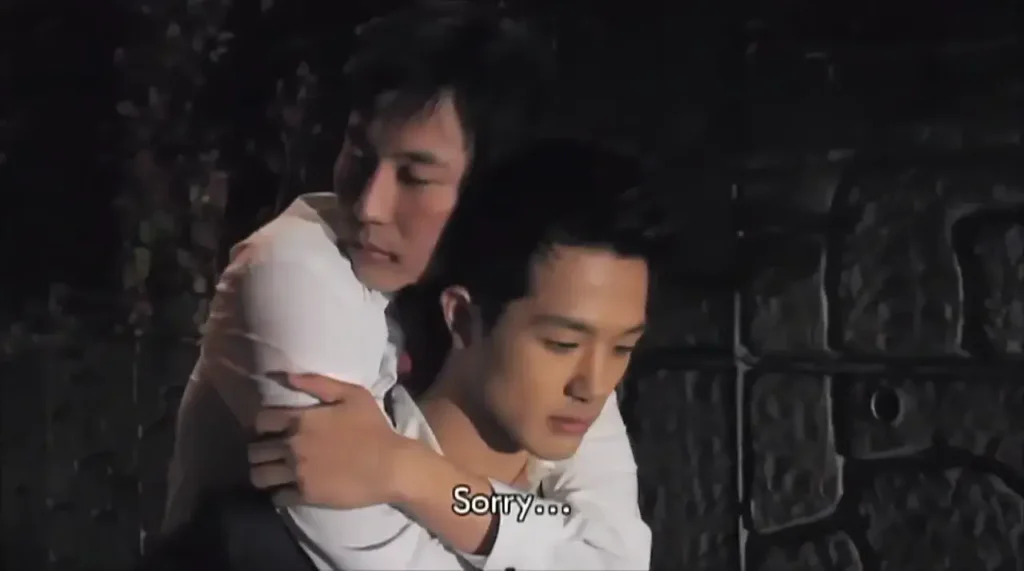
Genre: Drama, Romance
Runtime: 114 minutes
Rating: ★★★★ (7.6/10)
Where to Watch: Asian Crush, Tubi, YouTube
Synopsis: Raised in an orphanage, Su-min (Lee Young-hoon) comes to Seoul in search of work. Notwithstanding challenges, his life is happy. He hired one day to drive for the drunk Jae-min (Kim Nam-gil), who is instantly drawn to Su-min and advances sensually. Su-min quits his driving job and rejects these developments. Su-min finally eats his pride and starts working at a homosexual club when his plant starts to lay off people.
Jae-min is going to wed his family-selected fiancée, but he keeps looking for Su-min and cannot forget him. Su-min dismisses him often, but he finds his heart pulled to Jae-min and finally the two fall in love. When Jae-min’s mother finds out about their connection one day their love gets frozen. While Su-min, who regards Jae-min as his everything, slips into hitherto unheard-of hopelessness, Jae-min battles between reality and love. What will their ardent love become in this frigid city?
Review: Lee Young-hoon won the New Actor Award in Korean cinema that year, hence this movie was rather popular in South Korea.
I personally think this movie to be not dull. People who find it dull most likely do not know real love. Love has no conditions—no distinctions in gender, age, or color.
See this movie without bias. Neither is it solely for homosexual viewers nor pornographic. Everybody could use it. The director merely illustrates that loving someone is pure and without regret by means of an other kind of love.

Genre: Drama, Road Movie
Runtime: 112 minutes
Rating: ★★★★ (7.5/10)
Where to Watch: Korean Film Archive, Criterion Channel
Synopsis: The narrative, which takes place at a far-off, scarcely inhabited post office, centers on two female workers whose sole source of pleasure is a young man who routinely visits to mail letters. When the young man delivers a postcard with a love message one day, both women think it is meant for them. The more impetuous worker chooses to visit the young man’s house, only to find the shocking realit.
Review: Two guys—the young man distributing postcards and the mail carrier Chung-woo—are the actual heroes. Serving as observers to the men’s story are the two ladies, both post office counter agents and Chung-woo colleagues. Though not in an unpleasant manner, the women totally reflect gossipy and enamored traits. Both of them are really beautiful. Their point of view gives the narrative more suspense and turns, therefore increasing its appeal.
The narrative between the two men has a soft blue tone akin to calm waves. Though not the major emphasis, the red high heels provide a striking accent color in this delicate watercolor painting, which accentuates the blue feel even more fresh and moving.
FAQ About Korean Gay Movies
What are the best Korean gay movies?
Some of the most recommended Korean gay films include No Regret (2006), Night Flight (2014), Made on the Rooftop (2020), and Moonlit Winter (2019). These movies explore themes of identity, love, and societal pressure in uniquely Korean cultural contexts.
Are there any Korean BL movies similar to Thai or Japanese BL?
While Korea has fewer BL-style romance films compared to Thailand or Japan, titles like Just Friends? (2009) and Wish You (2020) offer softer, romantic narratives closer to the BL genre. However, most Korean gay films tend to be more grounded, dramatic, or socially reflective.
Where can I watch Korean LGBTQ+ movies online?
You can find many Korean gay films on platforms like GagaOOLala, Viki, Netflix (select titles), or through film festival websites. For short films, YouTube often has official releases, especially from queer film festivals in Seoul or Busan.
Do Korean gay movies have happy endings?
Some do, but many Korean LGBTQ+ films lean toward realistic or bittersweet conclusions, reflecting the social challenges queer people face in Korea. Films like Made on the Rooftop and To My River balance hope and heartache.
Are there any historical Korean gay films?
Yes. The King and the Clown (2005) and A Frozen Flower (2008) are set in historical periods and feature homoerotic or queer-coded relationships, though they aren’t explicit LGBTQ+ narratives by modern standards. Still, they are culturally significant to Korean queer cinema history.
Is Korean society accepting of LGBTQ+ films?
Progress has been made, especially in indie cinema, but mainstream acceptance remains limited. Despite censorship and societal conservatism, Korean queer filmmakers continue to create impactful stories that are gaining recognition globally.


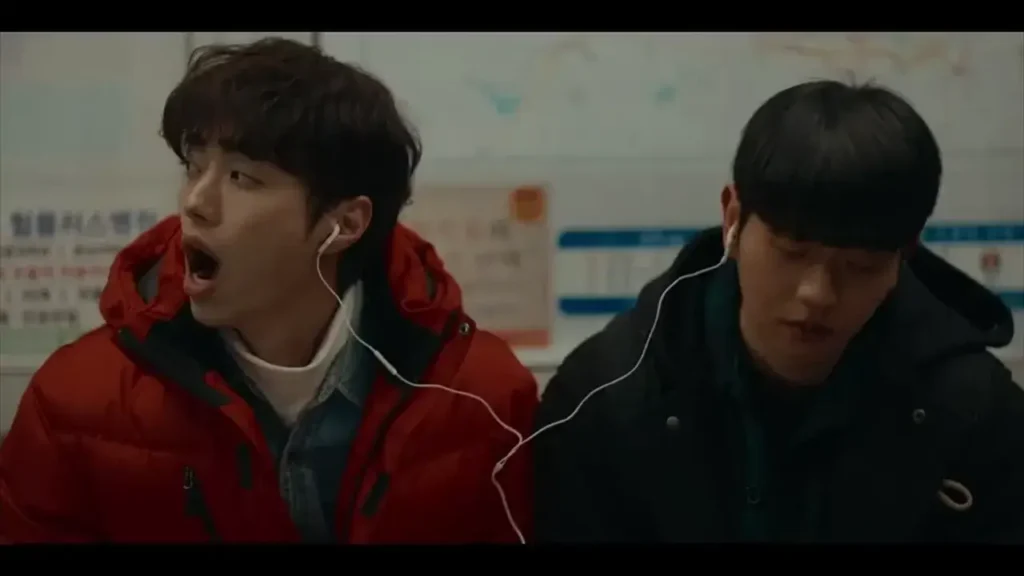
 Also explore:
Also explore: